| Srl | Item |
| 1 |
ID:
111215
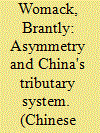

|
|
|
|
|
| Publication |
2012.
|
| Summary/Abstract |
In his article, 'Equilibrium Analysis of the Tributary System', Zhou Fangyin presents an important and stimulating application of the game theory of patterns of interaction to China's traditional diplomacy with its neighbors.1 His analysis contradicts the realist expectation that the larger power would simply dominate smaller powers in the context of international anarchy. However, his explanation of the tributary system does not rely on a cultural explanation based on Confucian morality, but rather on processes of conflictual interaction that lead to mutual accommodation between China and its neighbors.
Zhou rightly emphasizes the two-way character of the tributary system and the centrality of its basic idea for Chinese diplomacy. In contrast to John Fairbank, he argues that it is more than a diplomatic cover for a trade relationship. In contrast to the general assumption that tribute is a form of booty that a larger power requires from a smaller power, he emphasizes China's primary interest in stabilizing its relationships with neighbors through concessions. Indeed, it appears from Zhou's narration that China is at the disadvantaged side of tributary relationships: frustrated in conflicts and conceding to neighbors in order to pacify its borders. By providing a clear and plausible model for interaction and interesting, complex cases of processes through which to arrive at equilibrium, Zhou has, indeed, made a contribution to both theory and history.
|
|
|
|
|
|
|
|
|
|
|
|
|
|
|
|
| 2 |
ID:
126399


|
|
|
| 3 |
ID:
121560


|
|
|
|
|
| Publication |
2013.
|
| Summary/Abstract |
WHAT DOES China want? As the country's remarkable rise continues and as Beijing's interests seem to clash more frequently with those of its neighbors and the United States, the answer grows ever more important for American policy makers. Recently, a civilian analyst at the U.S. Pacific Command headquarters in Hawaii sought to shed light on the issue. The analyst, Timothy R. Heath, braved the notoriously turgid prose in Chinese official documents and identified the stated "desired end state" for the country. It is wrapped up in the term "national rejuvenation."
|
|
|
|
|
|
|
|
|
|
|
|
|
|
|
|
| 4 |
ID:
126387


|
|
|
| 5 |
ID:
126869
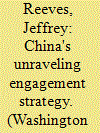

|
|
|
| 6 |
ID:
126398
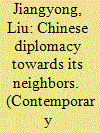

|
|
|
| 7 |
ID:
120870


|
|
|
|
|
| Publication |
2013.
|
| Summary/Abstract |
In examining the diffusion of social and political phenomena like regime transition, conflict, and policy change, scholars routinely make choices about how proximity is defined and which neighbors should be considered more important than others. Since each specification offers an alternative view of the networks through which diffusion can take place, one's decision can exert a significant influence on the magnitude and scope of estimated diffusion effects. This problem is widely recognized, but is rarely the subject of direct analysis. In international relations research, connectivity choices are usually ad hoc, driven more by data availability than by theoretically informed decision criteria. We take a closer look at the assumptions behind these choices, and propose a more systematic method to asses the structural similarity of two or more alternative networks, and select one that most plausibly relates theory to empirics. We apply this method to the spread of democratic regime change and offer an illustrative example of how neighbor choices might impact predictions and inferences in the case of the 2011 Arab Spring.
|
|
|
|
|
|
|
|
|
|
|
|
|
|
|
|
| 8 |
ID:
126048


|
|
|
| 9 |
ID:
126401


|
|
|
| 10 |
ID:
098020


|
|
|
| 11 |
ID:
105517


|
|
|
| 12 |
ID:
139871


|
|
|
|
|
| Summary/Abstract |
Though the recent time has witnessed a sea change in global politics as the prominent players who are seemingly more visible in international politics in subtle as well as concrete ways, due to global trade, growing & interlinked market, science & technological advancement and its growing application in the everyday life of human civilization, transportation and communication facilities, interdependence among the countries for number of arsons like - controlling natural calamity, i.re. recent earth quake at Nepal, migration of skilled manpower, educational facilities access by the people from developing countries, growing trade blocks and import- export issues related to many countries.
|
|
|
|
|
|
|
|
|
|
|
|
|
|
|
|
| 13 |
ID:
105518
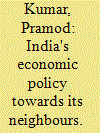

|
|
|
| 14 |
ID:
168188
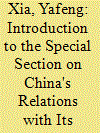

|
|
|
|
|
| Summary/Abstract |
This edition of Asian Perspective features a special section on China's relations with its neighbors, following a full special issue on the topic (Asian Perspective, vol. 42, no. 4, 2018). This special section comprises three articles that offer a historical lens on China's contemporary relations with India, Burma, and Sri Lanka, respectively. Making use of archival documentation from the Chinese Foreign Ministry archives and the Jawaharlal Nehru Memorial Museum and Library, Chaowu Dai explores the evolution of China's policy toward Sino-Indian border disputes. Dai argues that the People's Republic of China (PRC) attempted to peacefully resolve its border disputes with neighboring countries through negotiations. According to Dai, the PRC adopted this approach in resolving its border disputes with Burma, Nepal, and Pakistan prior to the Sino-Indian border clashes in 1959. He thus challenges the view of Indian and Western scholars that China was pursuing territorial expansion.
|
|
|
|
|
|
|
|
|
|
|
|
|
|
|
|
| 15 |
ID:
099522


|
|
|
| 16 |
ID:
115004


|
|
|
|
|
| Publication |
2011.
|
| Summary/Abstract |
The recent heightening of the competition between China and its neighbors
over sovereignty, resources, and security in the South China Sea has drawn
the attention of diplomatic and military leaders from many countries that seek
to promote stability and security in these globally important waters. For states
that ring the South China Sea, its waters represent a zone of rich hydrocarbon
and protein resources that are increasingly dear on land as populations exhaust
their territories' ability to meet their increasing needs. This resource competition alone could be the basis of sharp-edged disputes between the claimants.
However, the South China Sea also represents the projection of the cultural consciousness of the centuries-long relationship that each coastal nation has had
with its adjoining seas. This fact fuels competing modern-day nationalist tendencies among claimant-state populations, tendencies that in turn magnify the
importance of the disputes and, during times of crisis, narrow the options for
quiet negotiation or de-escalation.
|
|
|
|
|
|
|
|
|
|
|
|
|
|
|
|
| 17 |
ID:
186576
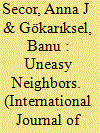

|
|
|
|
|
| Summary/Abstract |
This study takes a critical perspective on the making of sectarian difference and Alevi precarity in contemporary Turkey. Drawing on our research from 2013 to 2016, we present an analysis of stories and conversations that took place amongst Alevi and Sunni focus group participants, primarily in Istanbul. These conversations illustrate how sectarian difference can be made in the relations between neighbors as differences become coded as sectarian and taken up within systems of power and domination. At the same time, our research also shows how, in the entangled relations between neighbors, questions of ethics and mutual responsibility arise, though these relations sometimes become uneasy or even unbearable. Finally, we show how the question of “knowing” difference is taken up within a power-laden discourse of sectarianism, one that is tied to the history of Alevis (and others) in Turkey while also extending well beyond this context.
|
|
|
|
|
|
|
|
|
|
|
|
|
|
|
|